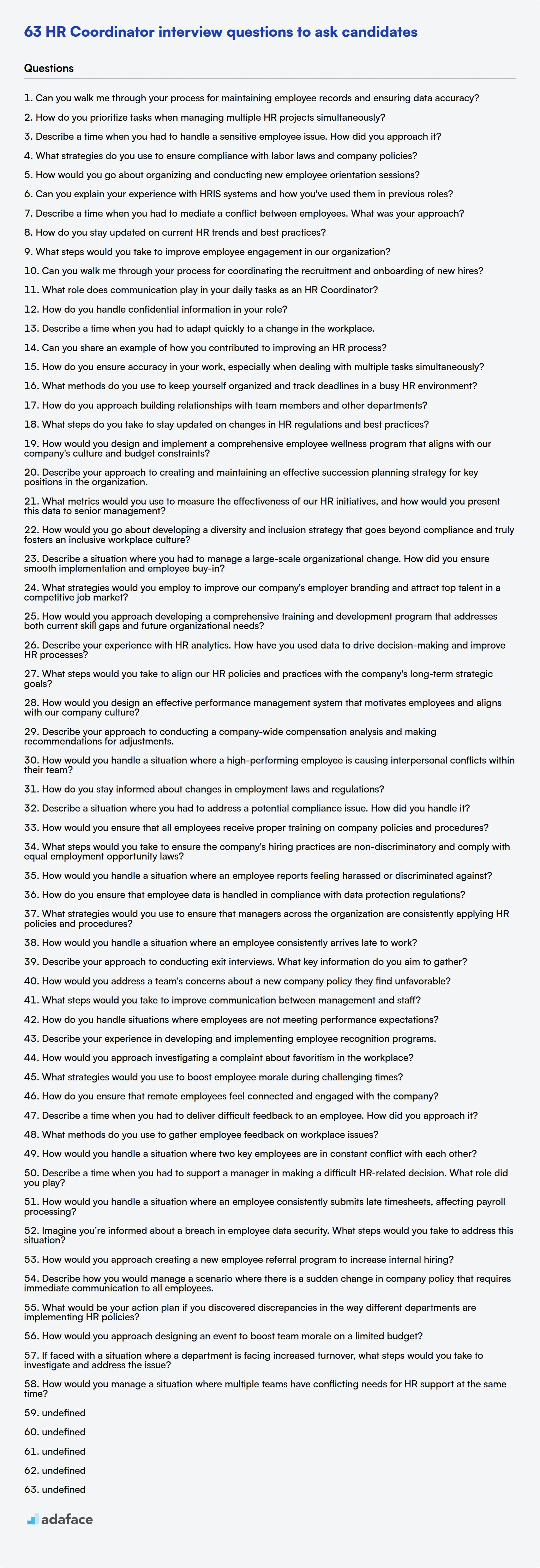Hiring the right HR Coordinator can significantly impact your organization's efficiency and employee satisfaction. To make an informed decision during the recruitment process, it's important to explore various interview techniques tailored to assess the skills necessary for this role.
This blog post offers a comprehensive list of HR Coordinator interview questions designed to evaluate candidates at different experience levels. From basic questions to advanced situational scenarios, you'll gain insights into assessing candidates' capabilities and suitability for your team.
By utilizing this guide, you'll streamline your interview process to effectively identify top candidates for your HR Coordinator position. Consider complementing your interviews with a tailored HR test to enhance your assessment approach.
Table of contents
10 basic HR Coordinator interview questions and answers to assess candidates
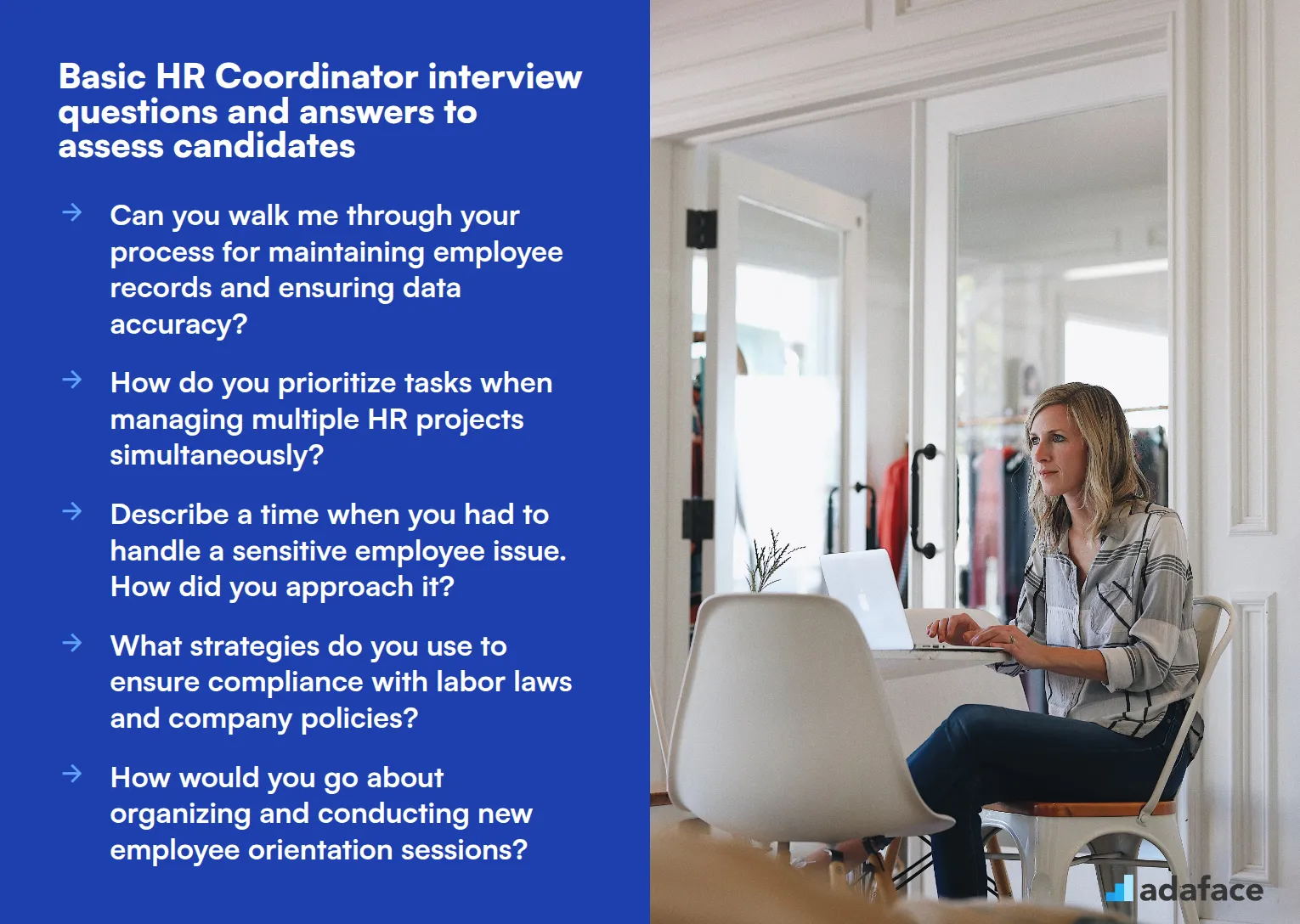
To effectively assess candidates for the HR Coordinator role, use these basic interview questions. They'll help you gauge a candidate's understanding of core HR functions, problem-solving abilities, and cultural fit. Use these questions as a starting point to dive deeper into each candidate's experience and skills.
- Can you walk me through your process for maintaining employee records and ensuring data accuracy?
- How do you prioritize tasks when managing multiple HR projects simultaneously?
- Describe a time when you had to handle a sensitive employee issue. How did you approach it?
- What strategies do you use to ensure compliance with labor laws and company policies?
- How would you go about organizing and conducting new employee orientation sessions?
- Can you explain your experience with HRIS systems and how you've used them in previous roles?
- Describe a time when you had to mediate a conflict between employees. What was your approach?
- How do you stay updated on current HR trends and best practices?
- What steps would you take to improve employee engagement in our organization?
- Can you walk me through your process for coordinating the recruitment and onboarding of new hires?
8 HR Coordinator interview questions and answers to evaluate junior coordinators
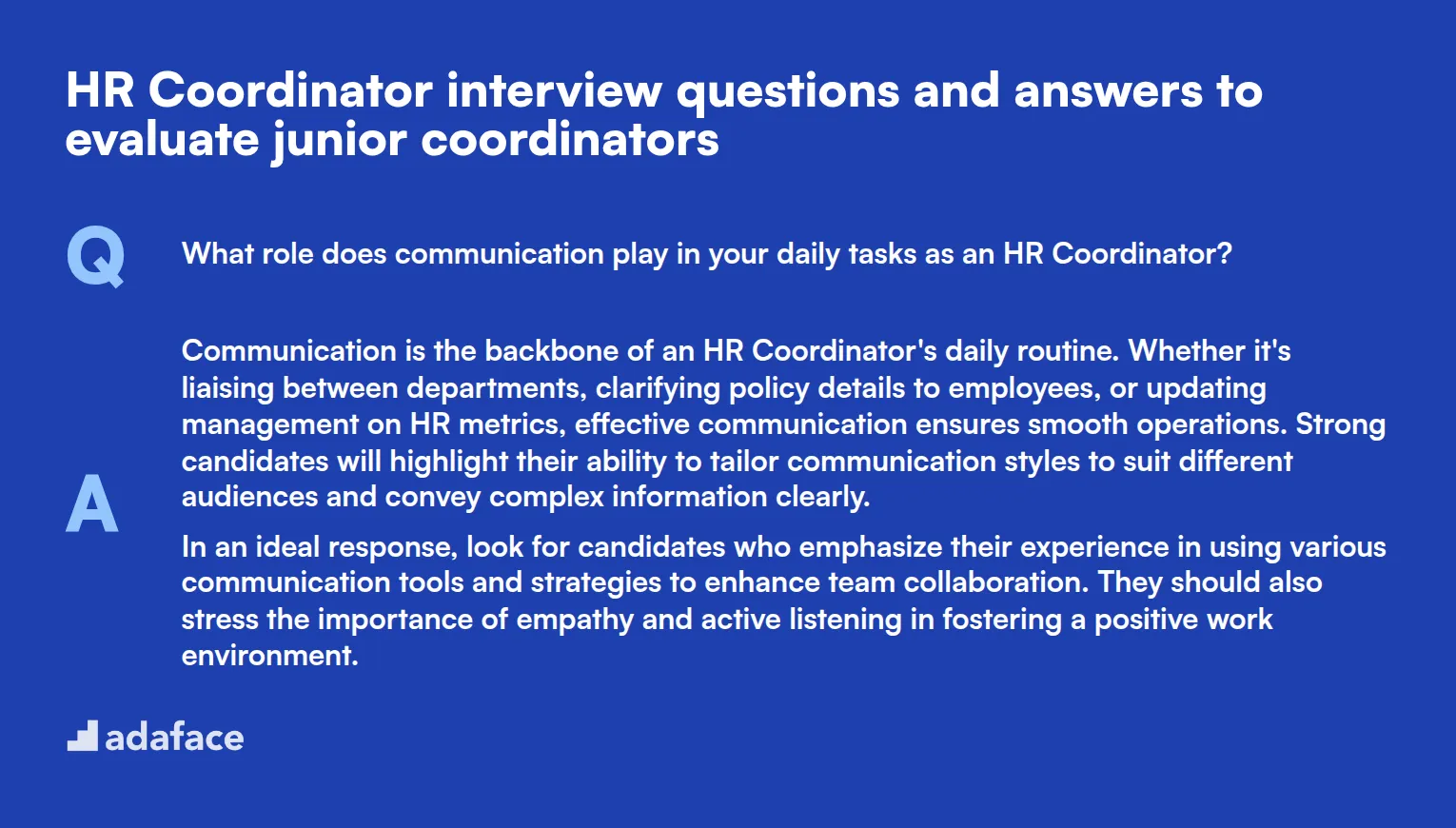
To gauge if a junior HR Coordinator is ready to tackle the challenges of your workplace, consider using this curated list of interview questions. These questions will help uncover the candidate's practical skills and problem-solving abilities, ensuring that they're prepared for the role's demands.
1. What role does communication play in your daily tasks as an HR Coordinator?
Communication is the backbone of an HR Coordinator's daily routine. Whether it's liaising between departments, clarifying policy details to employees, or updating management on HR metrics, effective communication ensures smooth operations. Strong candidates will highlight their ability to tailor communication styles to suit different audiences and convey complex information clearly.
In an ideal response, look for candidates who emphasize their experience in using various communication tools and strategies to enhance team collaboration. They should also stress the importance of empathy and active listening in fostering a positive work environment.
2. How do you handle confidential information in your role?
Handling confidential information is a critical responsibility in HR. Candidates should express their understanding of the importance of discretion and the protocols for maintaining confidentiality. They should discuss measures like secure storage, controlled access, and adherence to organizational policies and legal guidelines.
Expect candidates to mention specific examples where they effectively maintained confidentiality in past roles. Ideal answers will include a strong commitment to ethical standards and awareness of potential risks associated with data breaches.
3. Describe a time when you had to adapt quickly to a change in the workplace.
Adaptability is essential in HR, where changes in policies or management decisions can occur frequently. A candidate should recount a specific instance where they navigated such a change, detailing the challenges faced and the strategies employed to handle them.
Look for responses that showcase the candidate's ability to remain calm under pressure, quickly learn new information, and apply it effectively. Bonus points if they can demonstrate how their adaptability positively impacted their team or the organization.
4. Can you share an example of how you contributed to improving an HR process?
Contributing to process improvements indicates initiative and a proactive mindset. Candidates should describe a situation where they identified inefficiencies and implemented solutions that enhanced HR operations. This could involve streamlining a recurring task, introducing a new tool, or refining an existing procedure.
Ideal candidates will provide a clear explanation of the problem, the steps taken to address it, and the outcomes of their efforts. Look for a focus on measurable improvements, such as increased efficiency or reduced errors.
5. How do you ensure accuracy in your work, especially when dealing with multiple tasks simultaneously?
Accuracy in multitasking requires organization, attention to detail, and prioritization. Candidates should discuss strategies like using checklists, setting realistic deadlines, and leveraging technology to manage workload effectively.
A strong answer will include specific tools or methods they use to maintain accuracy, along with examples where these approaches successfully prevented errors or completed tasks efficiently. This reflects their ability to juggle responsibilities without compromising quality.
6. What methods do you use to keep yourself organized and track deadlines in a busy HR environment?
Staying organized in a dynamic HR setting involves using both digital tools and traditional methods. Candidates might mention using project management software, digital calendars, or even good old-fashioned to-do lists to keep track of tasks and deadlines.
The best answers will showcase a candidate's ability to prioritize tasks based on urgency and importance, ensuring nothing falls through the cracks. They should also emphasize flexibility, allowing them to adjust plans as new priorities arise.
7. How do you approach building relationships with team members and other departments?
Building strong relationships within and across departments is crucial for HR Coordinators. Candidates should discuss their approach to fostering open communication, building trust, and collaborating effectively with colleagues.
An ideal response will highlight active listening skills, empathy, and the ability to understand different perspectives. Candidates should also provide examples of successful cross-departmental collaborations they've been a part of.
8. What steps do you take to stay updated on changes in HR regulations and best practices?
Staying informed about HR regulations is vital to ensure compliance and implement best practices. Candidates might mention subscribing to HR newsletters, attending workshops, or participating in online courses to keep their knowledge current.
Look for candidates who demonstrate a proactive approach to learning and adapting to changes. They should also emphasize the importance of applying this knowledge to benefit their organization, such as by improving policies or employee training programs.
12 advanced HR Coordinator interview questions to ask senior coordinators
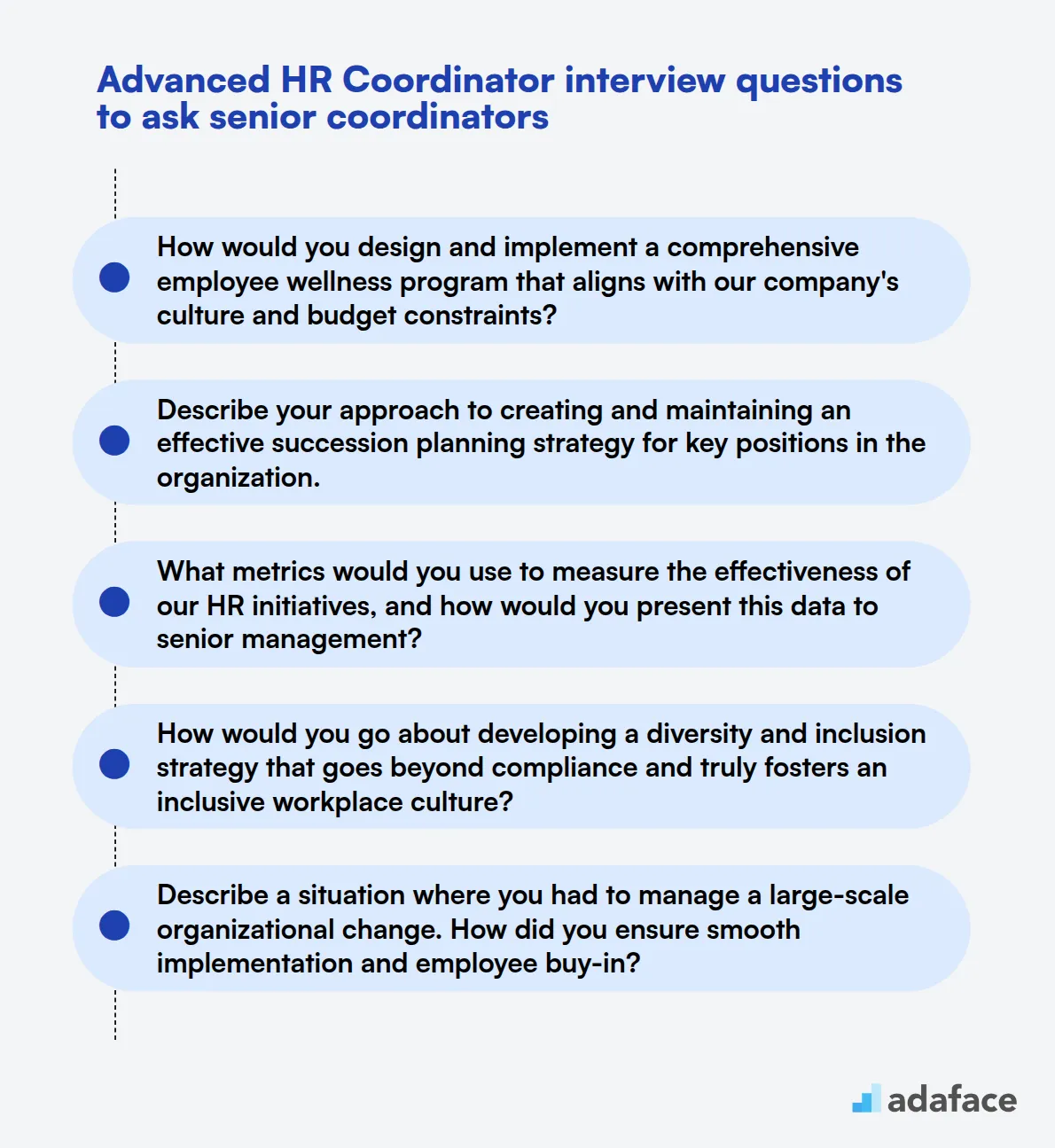
When interviewing senior HR Coordinators, it's crucial to delve deeper into their expertise and strategic thinking. These advanced questions will help you assess candidates' ability to handle complex HR challenges and contribute to organizational growth. Use them to evaluate experienced professionals who can elevate your HR function.
- How would you design and implement a comprehensive employee wellness program that aligns with our company's culture and budget constraints?
- Describe your approach to creating and maintaining an effective succession planning strategy for key positions in the organization.
- What metrics would you use to measure the effectiveness of our HR initiatives, and how would you present this data to senior management?
- How would you go about developing a diversity and inclusion strategy that goes beyond compliance and truly fosters an inclusive workplace culture?
- Describe a situation where you had to manage a large-scale organizational change. How did you ensure smooth implementation and employee buy-in?
- What strategies would you employ to improve our company's employer branding and attract top talent in a competitive job market?
- How would you approach developing a comprehensive training and development program that addresses both current skill gaps and future organizational needs?
- Describe your experience with HR analytics. How have you used data to drive decision-making and improve HR processes?
- What steps would you take to align our HR policies and practices with the company's long-term strategic goals?
- How would you design an effective performance management system that motivates employees and aligns with our company culture?
- Describe your approach to conducting a company-wide compensation analysis and making recommendations for adjustments.
- How would you handle a situation where a high-performing employee is causing interpersonal conflicts within their team?
7 HR Coordinator interview questions and answers related to compliance and regulations
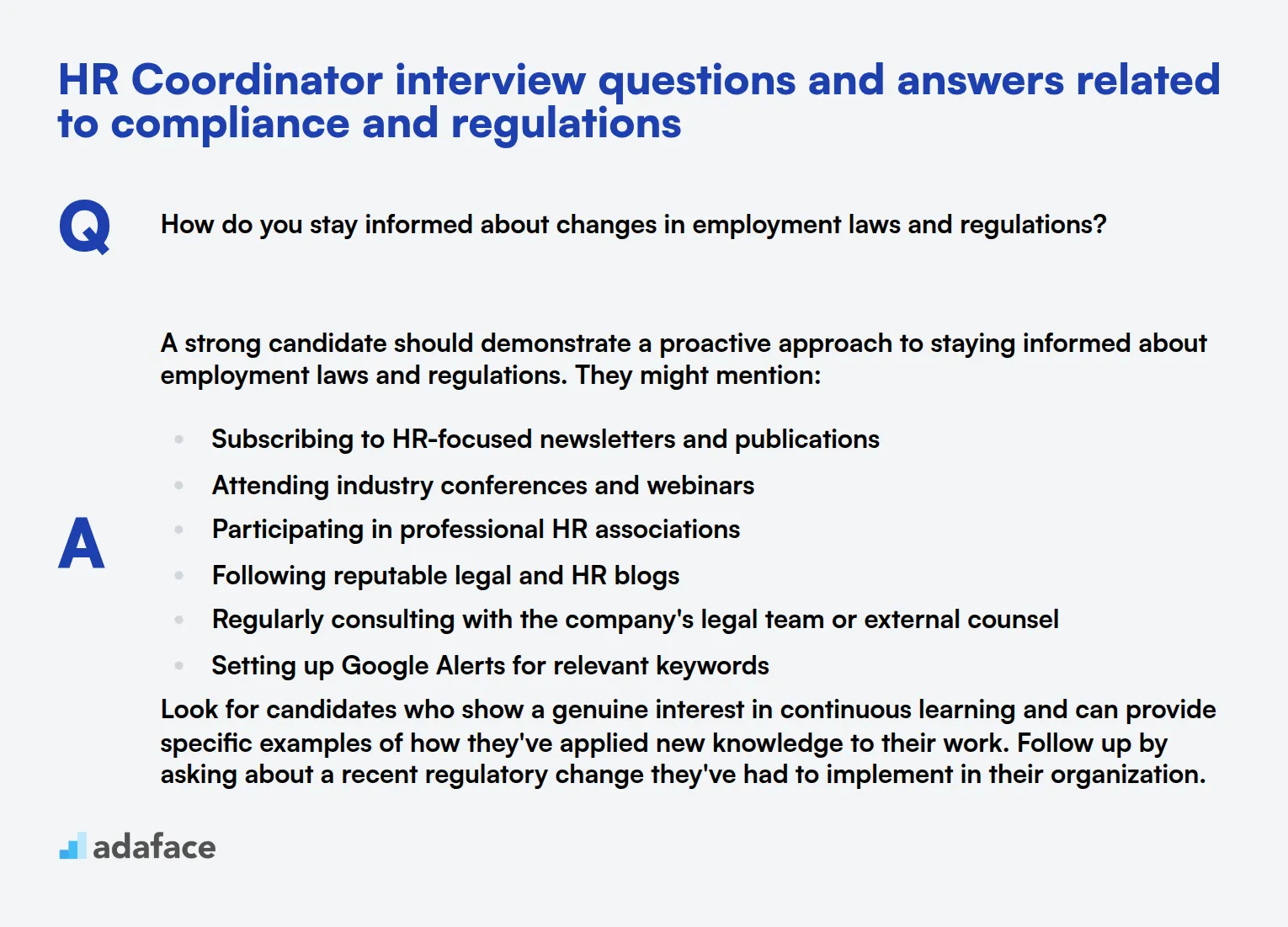
Compliance and regulations are crucial aspects of an HR Coordinator's role. To ensure your candidates have a solid grasp of these important areas, use the following questions to assess their knowledge and problem-solving skills. These questions will help you evaluate applicants on their understanding of legal requirements, ethical considerations, and best practices in maintaining a compliant workplace.
1. How do you stay informed about changes in employment laws and regulations?
A strong candidate should demonstrate a proactive approach to staying informed about employment laws and regulations. They might mention:
- Subscribing to HR-focused newsletters and publications
- Attending industry conferences and webinars
- Participating in professional HR associations
- Following reputable legal and HR blogs
- Regularly consulting with the company's legal team or external counsel
- Setting up Google Alerts for relevant keywords
Look for candidates who show a genuine interest in continuous learning and can provide specific examples of how they've applied new knowledge to their work. Follow up by asking about a recent regulatory change they've had to implement in their organization.
2. Describe a situation where you had to address a potential compliance issue. How did you handle it?
An effective answer should outline a clear process for addressing compliance issues:
- Identifying the potential issue
- Researching relevant laws and regulations
- Consulting with appropriate stakeholders (e.g., legal team, management)
- Developing a plan to address the issue
- Implementing necessary changes
- Monitoring the situation to ensure ongoing compliance
Pay attention to how the candidate balances urgency with thoroughness in their approach. Look for evidence of their ability to communicate effectively with different departments and levels of management during the process. Consider asking follow-up questions about the long-term impact of their actions on the organization's compliance practices.
3. How would you ensure that all employees receive proper training on company policies and procedures?
A comprehensive answer might include the following elements:
- Developing a structured onboarding process for new hires
- Creating engaging training materials (e.g., interactive modules, videos)
- Implementing regular refresher courses for existing employees
- Tracking completion rates and following up with non-compliant employees
- Tailoring training content to different departments or roles
- Gathering feedback to continuously improve training effectiveness
Look for candidates who emphasize the importance of making training accessible and relevant to all employees. They should also mention methods for measuring the effectiveness of training programs, such as pre and post-training assessments or monitoring policy violations. Consider asking about their experience with learning management systems or other training tools.
4. What steps would you take to ensure the company's hiring practices are non-discriminatory and comply with equal employment opportunity laws?
A strong answer should cover various aspects of the hiring process:
- Reviewing job descriptions to ensure they are free from biased language
- Implementing structured interviews with standardized questions
- Training hiring managers on unconscious bias and fair hiring practices
- Using diverse interview panels
- Regularly auditing hiring data to identify potential disparities
- Establishing clear criteria for candidate evaluation
- Ensuring job postings are accessible to a diverse candidate pool
Look for candidates who demonstrate a thorough understanding of EEO laws and best practices in inclusive hiring. They should also mention the importance of documentation throughout the hiring process. Consider asking about their experience in implementing or improving diversity and inclusion initiatives in previous roles.
5. How would you handle a situation where an employee reports feeling harassed or discriminated against?
An effective response should outline a clear process for handling such sensitive situations:
- Listen to the employee's concerns attentively and empathetically
- Document the complaint in detail
- Assure the employee of confidentiality and non-retaliation
- Inform relevant parties (e.g., HR manager, legal team) as per company policy
- Conduct a thorough and impartial investigation
- Take appropriate corrective action based on investigation findings
- Follow up with the complainant and ensure ongoing support
Look for candidates who emphasize the importance of taking all complaints seriously and acting promptly. They should also mention the need to balance confidentiality with the necessity of a thorough investigation. Consider asking about their experience in conducting workplace investigations or their knowledge of relevant anti-discrimination laws.
6. How do you ensure that employee data is handled in compliance with data protection regulations?
A comprehensive answer should cover various aspects of data protection:
- Implementing secure storage systems for employee data
- Restricting access to sensitive information on a need-to-know basis
- Regularly updating and enforcing data protection policies
- Providing training to employees on data privacy best practices
- Ensuring proper disposal of physical and digital records
- Conducting regular audits of data handling processes
- Staying informed about changes in data protection laws (e.g., GDPR, CCPA)
Look for candidates who demonstrate an understanding of the importance of data privacy and the potential consequences of non-compliance. They should also mention the need for collaboration with IT departments to ensure technical safeguards are in place. Consider asking about their experience in implementing or improving data protection measures in previous roles.
7. What strategies would you use to ensure that managers across the organization are consistently applying HR policies and procedures?
An effective answer might include the following strategies:
- Developing clear, accessible policy documentation
- Providing regular training sessions for managers on HR policies
- Creating checklists or decision trees to guide managers through common HR processes
- Implementing a system for managers to easily seek guidance on policy application
- Conducting periodic audits to ensure consistent policy application
- Establishing a feedback loop to address common issues or misunderstandings
- Recognizing and rewarding managers who consistently apply policies correctly
Look for candidates who emphasize the importance of clear communication and ongoing education. They should also mention the need for accountability and the role of HR in supporting managers. Consider asking about their experience in developing manager training programs or their approach to handling situations where a manager has misapplied a policy.
12 HR Coordinator interview questions about employee relations
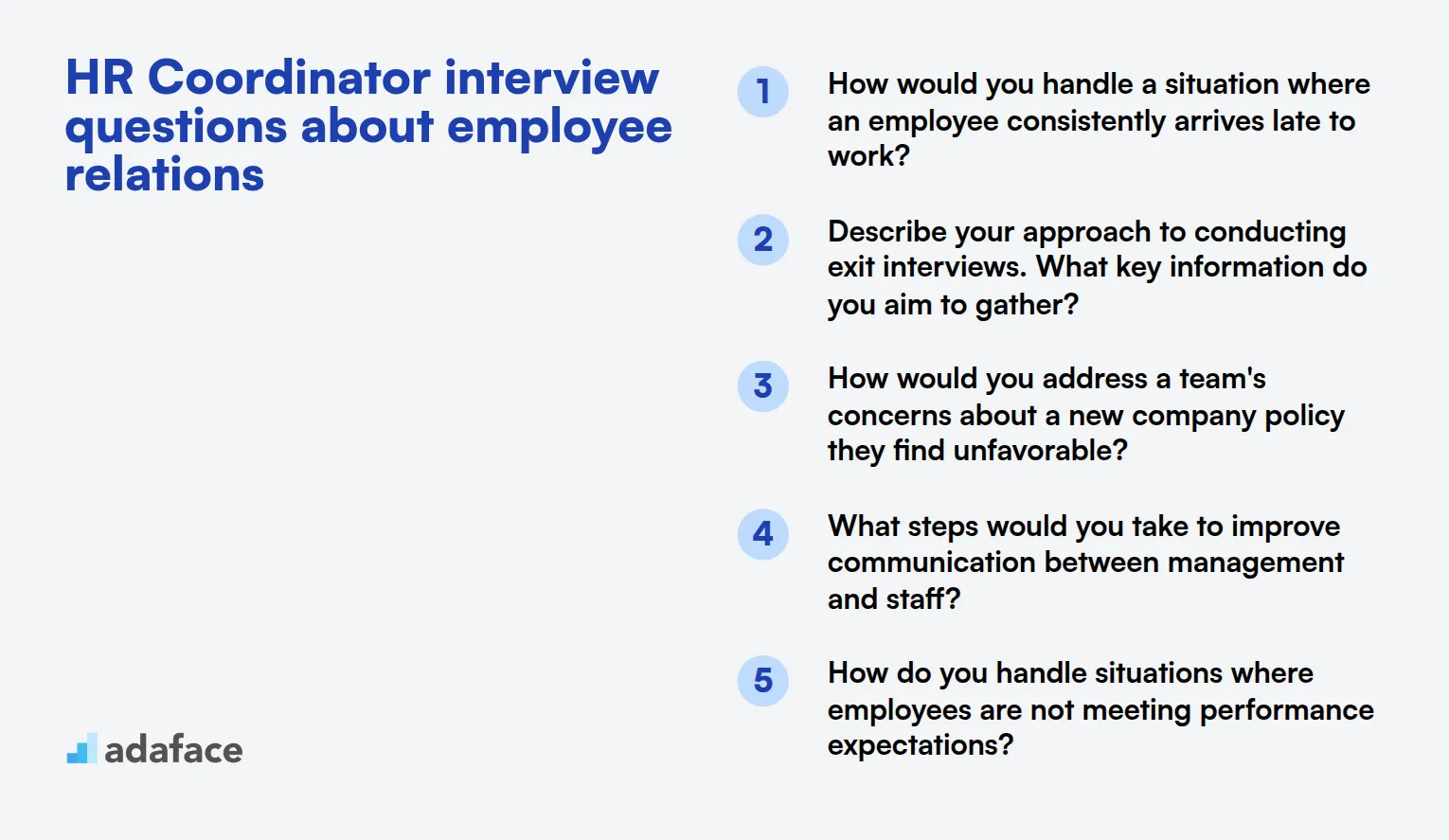
To assess a candidate's ability to handle employee relations, use these targeted HR Coordinator interview questions. These questions will help you evaluate the applicant's skills in managing workplace dynamics, resolving conflicts, and fostering a positive work environment.
- How would you handle a situation where an employee consistently arrives late to work?
- Describe your approach to conducting exit interviews. What key information do you aim to gather?
- How would you address a team's concerns about a new company policy they find unfavorable?
- What steps would you take to improve communication between management and staff?
- How do you handle situations where employees are not meeting performance expectations?
- Describe your experience in developing and implementing employee recognition programs.
- How would you approach investigating a complaint about favoritism in the workplace?
- What strategies would you use to boost employee morale during challenging times?
- How do you ensure that remote employees feel connected and engaged with the company?
- Describe a time when you had to deliver difficult feedback to an employee. How did you approach it?
- What methods do you use to gather employee feedback on workplace issues?
- How would you handle a situation where two key employees are in constant conflict with each other?
9 situational HR Coordinator interview questions for hiring top coordinators
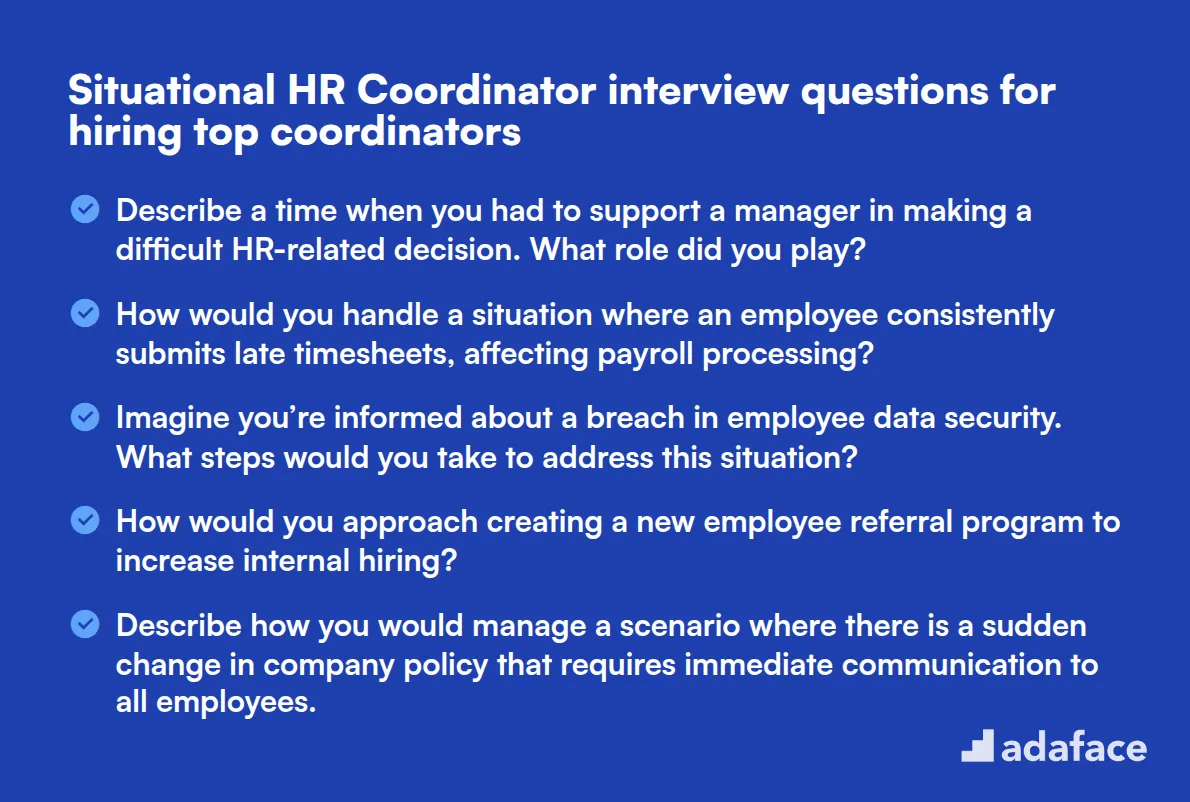
To ensure you hire the best HR Coordinators, use these situational questions to assess their problem-solving skills and adaptability in real-world scenarios. Whether you're preparing your first interview or refining your process, these questions can help you identify top talent and strengthen your HR team.
- Describe a time when you had to support a manager in making a difficult HR-related decision. What role did you play?
- How would you handle a situation where an employee consistently submits late timesheets, affecting payroll processing?
- Imagine you’re informed about a breach in employee data security. What steps would you take to address this situation?
- How would you approach creating a new employee referral program to increase internal hiring?
- Describe how you would manage a scenario where there is a sudden change in company policy that requires immediate communication to all employees.
- What would be your action plan if you discovered discrepancies in the way different departments are implementing HR policies?
- How would you approach designing an event to boost team morale on a limited budget?
- If faced with a situation where a department is facing increased turnover, what steps would you take to investigate and address the issue?
- How would you manage a situation where multiple teams have conflicting needs for HR support at the same time?
5 behavioral HR Coordinator interview questions and answers
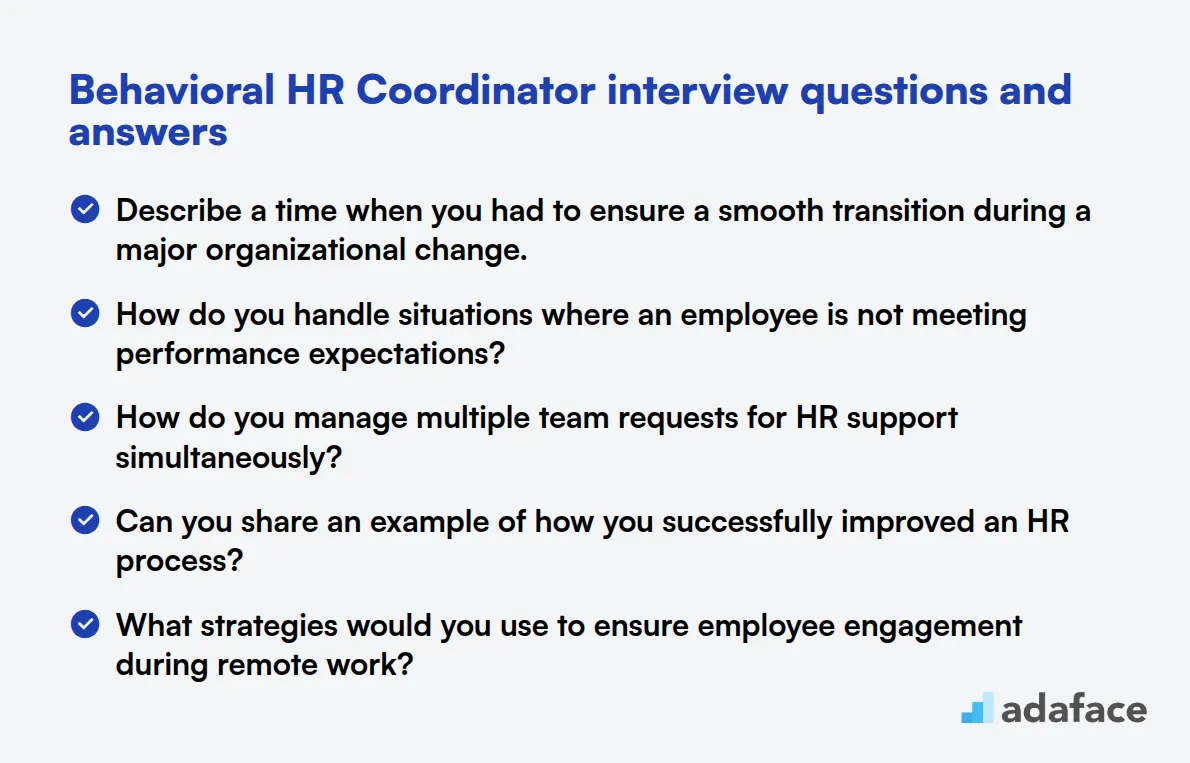
Behavioral questions are like the secret sauce in your interview recipe. They help you uncover how candidates have handled past situations, giving you a sneak peek into their future performance as an HR Coordinator. Use this list to explore their problem-solving skills, adaptability, and how they build relationships—all crucial aspects when looking for the perfect fit.
1. Describe a time when you had to ensure a smooth transition during a major organizational change.
Candidates should share an experience where they played a significant role in facilitating a transition, possibly involving new systems, processes, or structural changes within the company. They should talk about the steps they took to ensure that employees understood the change, accepted it, and adapted to it smoothly.
Look for responses that highlight proactive communication, collaboration with different departments, and strategic planning to minimize disruption. The ideal candidate might also mention follow-up surveys or feedback sessions to assess the success of the transition and make necessary adjustments.
2. How do you handle situations where an employee is not meeting performance expectations?
An effective HR Coordinator will approach this situation with empathy and professionalism. They should describe a process involving setting up a private meeting with the employee to discuss the performance issues, providing clear examples, and listening to the employee's perspective.
Candidates should outline a plan for performance improvement, which may include setting specific, measurable goals, offering additional training, and scheduling follow-up meetings to monitor progress. This showcases their commitment to helping employees succeed while maintaining company standards.
Look for candidates who emphasize the importance of clear communication and constructive feedback. They should also mention documenting these interactions as part of maintaining accurate employee records, which aligns with skills required for HR coordinators.
3. How do you manage multiple team requests for HR support simultaneously?
A strong candidate will demonstrate their ability to prioritize and multitask. They should mention using tools like task lists or project management software to keep track of requests and deadlines. They might also describe how they determine the urgency of requests and allocate time accordingly.
The response should highlight their ability to communicate effectively with team members, ensuring that expectations are set and managed. Look for candidates who can show flexibility and adaptability in shifting priorities when needed without compromising on service quality.
An ideal answer would also touch on their organizational skills and methods for maintaining a balance between urgent and important tasks, showcasing their capability to handle a dynamic HR environment.
4. Can you share an example of how you successfully improved an HR process?
Candidates should provide a specific example of an HR process they identified as inefficient and the steps they took to improve it. This could involve streamlining onboarding, enhancing communication channels, or automating manual tasks.
They should describe the outcome of these changes, such as increased efficiency, better employee satisfaction, or cost savings. The focus should be on their problem-solving skills and ability to implement effective solutions.
Look for candidates who emphasize the importance of feedback from stakeholders, demonstrating their dedication to continuous improvement and collaboration across departments.
5. What strategies would you use to ensure employee engagement during remote work?
Candidates should discuss innovative strategies to maintain employee engagement, such as regular virtual team meetings, online social events, and wellness programs. They might also mention using collaboration tools to keep communication lines open and encourage teamwork.
Responses should reflect an understanding of the challenges remote work poses and the importance of maintaining a positive company culture. Candidates might also discuss how they would solicit feedback from employees to continually improve engagement strategies.
The ideal candidate will emphasize adaptability and creativity in maintaining morale and connectedness among remote teams, showcasing their ability to support a diverse and distributed workforce effectively.
Which HR Coordinator skills should you evaluate during the interview phase?
Assessing a candidate's fit for the HR Coordinator role during an interview is a challenge. While a single interview cannot cover every aspect of a candidate's abilities, there are key skills that are critical to evaluate, especially in the context of HR functions.
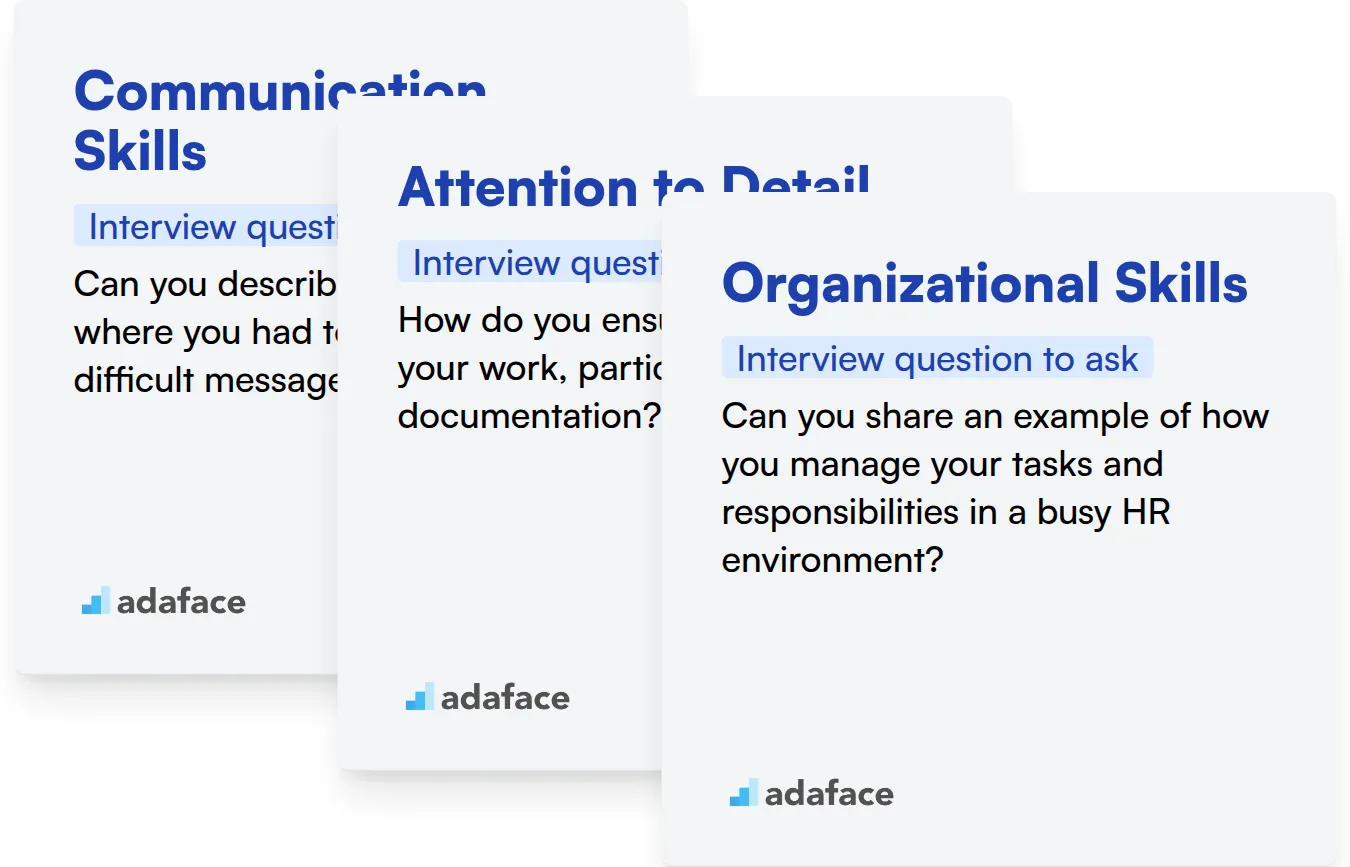
Communication Skills
To evaluate communication skills, consider using an assessment that includes relevant multiple-choice questions. This will help you gauge a candidate's understanding of effective communication practices in HR. You can find a suitable Communication Skills test here.
In addition to tests, targeted interview questions can help assess this skill. For example, you might ask:
Can you describe a situation where you had to communicate a difficult message to an employee?
When asking this question, look for clarity in their explanation of the situation, their approach to the communication, and the outcome. This will help you understand their ability to handle sensitive conversations effectively.
Attention to Detail
You can assess attention to detail through an MCQ test designed to evaluate candidates' precision and thoroughness. A relevant test can be found here.
Additionally, you can ask targeted questions to explore this skill further. One effective question could be:
How do you ensure accuracy in your work, particularly in HR documentation?
Listen for an answer that includes specific strategies they use to check their work, such as double-checking information or utilizing checklists. This will indicate their commitment to quality in their tasks.
Organizational Skills
Consider incorporating an MCQ assessment to test candidates on their organizational strategies and techniques. While we don't currently offer a specific test for organizational skills, general HR skills are covered in our Human Resource Management test.
To further evaluate this skill during the interview, you might ask:
Can you share an example of how you manage your tasks and responsibilities in a busy HR environment?
When they respond, pay attention to their methods of prioritization and task management. A thoughtful answer will reveal their ability to handle the dynamic nature of HR work.
Maximizing the Effectiveness of HR Coordinator Interview Questions
Before putting your newly acquired knowledge to use, consider these tips to enhance your HR Coordinator hiring process. These strategies will help you make the most of your interviews and select the best candidates.
1. Incorporate Skills Tests in Your Screening Process
Skills tests provide objective data on candidates' abilities, complementing their resumes and interview responses. They help you identify top performers early in the hiring process, saving time and resources.
For HR Coordinator roles, consider using tests that evaluate communication skills, attention to detail, and problem-solving abilities. These assessments will give you insights into candidates' core competencies.
Implement these tests after initial resume screening but before interviews. This approach allows you to focus your interviews on the most promising candidates, making the process more efficient and effective.
2. Curate a Balanced Set of Interview Questions
With limited interview time, it's crucial to ask the right questions. Focus on a mix of technical, behavioral, and situational questions to get a well-rounded view of each candidate.
Consider including questions about customer service aptitude and administrative skills, as these are often relevant to HR Coordinator roles. This combination will help you assess both job-specific skills and soft skills.
Remember to tailor your questions to your company's specific needs and culture. This customization will help you find candidates who are not only skilled but also a good fit for your organization.
3. Master the Art of Follow-Up Questions
Asking follow-up questions is key to uncovering the depth of a candidate's knowledge and experience. They help you distinguish between candidates who have memorized answers and those with genuine understanding and skills.
For example, if a candidate mentions experience with employee onboarding, you might ask, "Can you walk me through a specific onboarding process you've improved?" This follow-up allows you to assess their practical experience and problem-solving abilities in real-world scenarios.
Use skill tests and interview questions to hire talented HR Coordinators
If you're looking to hire someone with strong HR skills, it's important to ensure they possess those skills accurately. The most efficient way to do this is by utilizing skill tests, such as the HR Test available in our test library.
Once you complete the test, you can easily shortlist the best applicants and invite them for interviews. To get started, sign up on our platform here or explore our test library for more tailored assessments.
Attention To Detail Test
Download HR Coordinator interview questions template in multiple formats
HR Coordinator Interview Questions FAQs
An HR Coordinator should have strong organizational, communication, and interpersonal skills, as well as knowledge of HR practices, policies, and regulations.
Ask about their previous roles, responsibilities, and specific projects they've worked on in HR. Use situational questions to assess their problem-solving abilities.
Focus on their knowledge of HR processes, ability to handle confidential information, experience with HRIS, and skills in employee relations and compliance.
Use behavioral and situational interview questions that present challenging scenarios they might encounter in the role, and evaluate their approach to resolution.
Senior HR Coordinators typically have more experience, handle complex tasks independently, and may have supervisory responsibilities or specialized expertise in certain HR areas.

40 min skill tests.
No trick questions.
Accurate shortlisting.
We make it easy for you to find the best candidates in your pipeline with a 40 min skills test.
Try for freeRelated posts
Free resources




